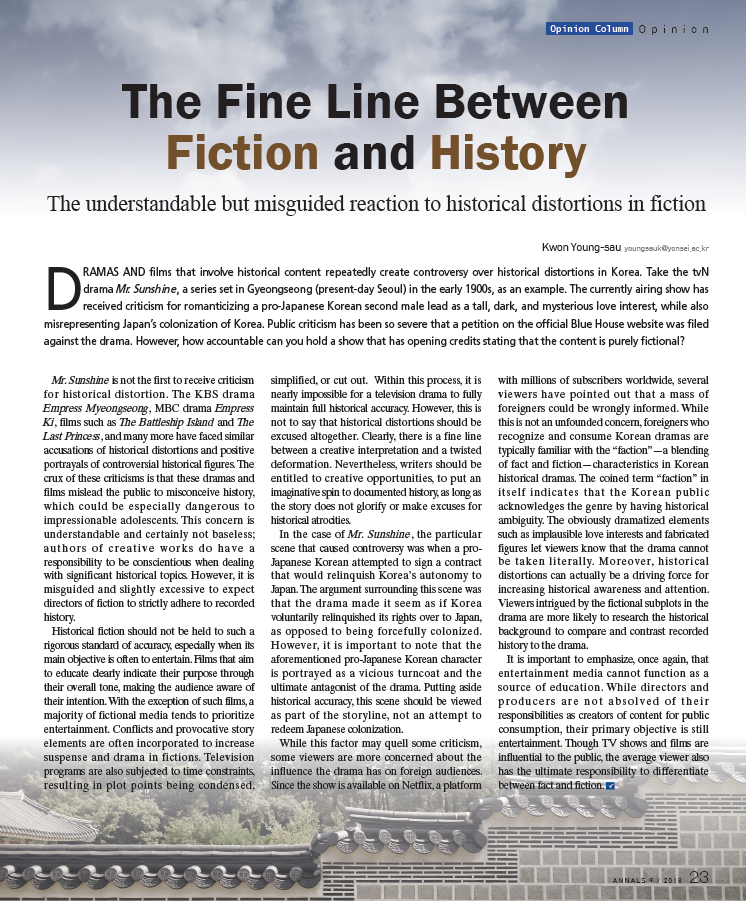The understandable but misguided reaction to historical distortions in fiction

DRAMAS AND films that involve historical content repeatedly create controversy over historical distortions in Korea. Take the tvN drama Mr. Sunshine, a series set in Gyeongseong (present-day Seoul) in the early 1900s, as an example. The currently airing show has received criticism for romanticizing a pro-Japanese Korean second male lead as a tall, dark, and mysterious love interest, while also misrepresenting Japan’s colonization of Korea. Public criticism has been so severe that a petition on the official Blue House website was filed against the drama. However, how accountable can you hold a show that has opening credits stating that the content is purely fictional?
Mr. Sunshine is not the first to receive criticism for historical distortion. The KBS drama Empress Myeongseong, MBC drama Empress Ki, films such as The Battleship Island and The Last Princess, and many more have faced similar accusations of historical distortions and positive portrayals of controversial historical figures. The crux of these criticisms is that these dramas and films mislead the public to misconceive history, which could be especially dangerous to impressionable adolescents. This concern is understandable and certainly not baseless; authors of creative works do have a responsibility to be conscientious when dealing with significant historical topics. However, it is misguided and slightly excessive to expect directors of fiction to strictly adhere to recorded history.
Historical fiction should not be held to such a rigorous standard of accuracy, especially when its main objective is often to entertain. Films that aim to educate clearly indicate their purpose through their overall tone, making the audience aware of their intention. With the exception of such films, a majority of fictional media tends to prioritize entertainment. Conflicts and provocative story elements are often incorporated to increase suspense and drama in fictions. Television programs are also subjected to time constraints, resulting in plot points being condensed, simplified, or cut out. Within this process, it is nearly impossible for a television drama to fully maintain full historical accuracy. However, this is not to say that historical distortions should be excused altogether. Clearly, there is a fine line between a creative interpretation and a twisted deformation. Nevertheless, writers should be entitled to creative opportunities, to put an imaginative spin to documented history, as long as the story does not glorify or make excuses for historical atrocities.
In the case of Mr. Sunshine, the particular scene that caused controversy was when a pro-Japanese Korean attempted to sign a contract that would relinquish Korea’s autonomy to Japan. The argument surrounding this scene was that the drama made it seem as if Korea voluntarily relinquished its rights over to Japan, as opposed to being forcefully colonized. However, it is important to note that the aforementioned pro-Japanese Korean character is portrayed as a vicious turncoat and the ultimate antagonist of the drama. Putting aside historical accuracy, this scene should be viewed as part of the storyline, not an attempt to redeem Japanese colonization.
While this factor may quell some criticism, some viewers are more concerned about the influence the drama has on foreign audiences. Since the show is available on Netflix, a platform with millions of subscribers worldwide, several viewers have pointed out that a mass of foreigners could be wrongly informed. While this is not an unfounded concern, foreigners who recognize and consume Korean dramas are typically familiar with the“faction”—a blending of fact and fiction—characteristics in Korean historical dramas. The coined term “faction” in itself indicates that the Korean public acknowledges the genre by having historical ambiguity. The obviously dramatized elements such as implausible love interests and fabricated figures let viewers know that the drama cannot be taken literally. Moreover, historical distortions can actually be a driving force for increasing historical awareness and attention. Viewers intrigued by the fictional subplots in the drama are more likely to research the historical background to compare and contrast recorded history to the drama.
It is important to emphasize, once again, that entertainment media cannot function as a source of education. While directors and producers are not absolved of their responsibilities as creators of content for public consumption, their primary objective is still entertainment. Though TV shows and films are influential to the public, the average viewer also has the ultimate responsibility to differentiate between fact and fiction.
Kwon Young-sau
youngsauk@yonsei.ac.kr

